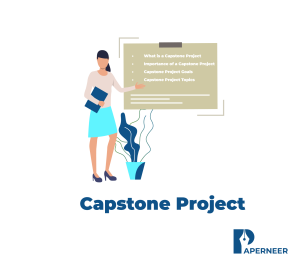Capstone Project – A Complete Guide A capstone project is sometimes the...
Read MoreGet Ideas of Informative Speech with Our Informative Speech Examples

What if you are encountered with delivering an informative speech in front of an audience and you do not have any knowledge about getting your informative speech prepared to be delivered on the podium? No worries! We will guide you on how to write an informative speech and provide you with examples of informative speeches that can assist you the best. This writing guide will not only assist you in preparing your speech but also give your audience a better and more credible piece of information. This blog focuses on presenting how to write an informative speech with various interesting informative speech examples to help you become a pro at writing and delivering informative speeches.
Table of Content
What is an Informative Speech?
An informative speech focuses on educating the audience with factual data and evidence that can help build credibility. This type aims to expand the audience’s knowledge base. It focuses on speaking about a concept, an object, a process, or an event. The content is based on information and facts and is non-persuasive in nature.
Purpose of Informative Speech
One of the most essential purposes of an informative speech is to share knowledge with the audience. A well-written and well-delivered informative speech helps spark curiosity in the audience to learn more about the subject matter. Understanding how to write an informative speech ensures that the content is unbiased and credible, focusing solely on providing valuable information rather than convincing the audience.
Understanding Informative Speech Outline with the Help of an Example
An Informative speech should contain a central idea around which the whole speech revolves. For instance, if you are to deliver an informative speech on “The importance of the Internet in Today’s Era”, your speech would need to cover the underlying outlines:
Introduction:
The introductory paragraph contains three main elements for perfectly introducing your topic to your audience.
- Attention-grabber or Hook: This first sentence, for example, “it is persistent to know how the Internet has become a crucial part of our lives,” should act like a hook to grab the audience’s attention towards your speech.
- Relevance: To make the audience relate to the topic, you will then have to explain how the Internet has become an integral part of our daily lives.
- Thesis Statement: It is where you give your audience the central theme of your speech. For instance, in the case mentioned, your thesis statement relies on the role of the Internet in our lives.
Body:
This part of the speech will contain several paragraphs to give the audience ample information about your topic. All the paragraphs would discuss a unique side or part of your topic.
- 1st Body Paragraph: If we consider our first body paragraph to discuss “Internet as a source to connect worldwide,” this would contain various supporting details to give an account of how the Internet generally and social media specifically can help people connect on a global level and how it can bring proximity virtually. Further, it can explain how the Internet can help share and disseminate news from each corner of the world, even if it is not available in mainstream media.
- 2nd Body Paragraph: This one can contain information about using the Internet for study and professional growth purposes. It can also discuss informative videos via YouTube and the provision of freelancing platforms.
- 3rd Body Paragraph: The third body paragraph discusses “the Internet as a source of entertainment.” This section discusses how the Internet and social media can help us enjoy our leisure time and temporarily escape our hectic daily routine.
Transition:
This is where you would transit your whole speech towards a conclusion. For the mentioned case, a transition can be “as many things about the importance of the internet have been discussed well, now it is the time to conclude the topic.”
Conclusion:
The conclusion aims to wrap up all the information concisely yet in a manner that can impact the audience’s minds. In conclusion, the thesis statement is once again rephrased; all the main points are very concisely given a touch and then contain a point that can assist the audience in thinking about your speech topic on their own. For example, as internet use has been proliferating, we must be aware of its productive use to get its utmost benefits.
Q & A Session:
This is an optional part where the audience can ask their queries from the speaker. The professional speakers mainly provide this.
Salutation:
You will then thank your audience for their active listening and time.
An Example of Informative Speech
An informative speech can be delivered on different topics and themes. As it is clear from the guidance on how to write an informative speech provided above, the below-mentioned interesting examples can further help you in learning the process of crafting engaging and effective informative speeches.
Elements of National Power
Good Evening, Ladies and gentlemen!
Today, we will discuss one of the most crucial concepts of International Relations and Political Sciences, i.e., Elements of National Power. Understanding the elements of national power is essential to know how countries prevail on the global stage, influence International Affairs, and secure their national interests.
National power encompasses military and economic power, political stability, geography, population, technological power, resources, and many other elements.
We will shed light on some of the main elements I mentioned.
The first element that I will discuss with you is a state’s geography. Geography means the boundary and territory, its size, terrain, typology, climate, etc. Afghanistan, due to its location and geography, has always been a war zone, and its geography is being proven to be a weaker point for the state. On the other hand, the geography of the US and Britain is an actual element of their power.
The territory’s natural minerals can become a blessing for the state if it can protect its resources like the powerful states do. However, it can become a curse if the state cannot protect. The powerful countries can exploit these resources and minerals and can endanger the state’s sovereignty through its exploitation.
A state’s population can also be proven to be an element of its power. However, the population needs to be of a quality. An educated and literate population prospers the country better than a population of a bigger size but of poor quality.
To wrap up my speech, I would once again emphasize that a state is not only strong because of its strong military but also because it has all the other elements of national power, like good leadership and governance, quality population, better geography, political stability, and soft and economic power. I extend my gratitude and thank you all for your active listening. Thank you so very much indeed!
Informative Speech Examples for Students
Students usually deliver speeches in school, college, or even university. At the primary level, when students are told to give a speech in schools, the purpose is to boost their confidence and provide them with a platform to learn public speaking skills. Their speeches are not replete with heavy ideas and concepts but some basic themes and information they feel at ease while delivering.
For instance, they are primarily tasked with delivering speeches on the state’s Independence Day or any special occasion or event. This blog not only provides examples of informative speeches for students in schools and colleges but also guides you on how to write an informative speech effectively.
Informative Speech Topics
You can also use the following topics for practicing your informative speeches:
- Importance of Meditation
- Pros and Cons of Netflix
- How to avoid binge-watching?
- Impact of Social Media on Socio-cultural Norms
- A Historical Account of World War II
- Artificial Intelligence in Changing the Workplaces
- Power of Habits on Lifestyle
- Importance of Emotional Intelligence
- Impact of Standardized Testing on Student Learning
- The Role of Women in World War II
Say goodbye to Mistakes in Term Papers
Avoid Errors in Term Papers Writing a theme may be a vital tutorial task that needs careful designing and...
Read MoreUnraveling the Stories: Autobiography vs Biography
Autobiography vs Biography Understanding the excellence between autobiography and biography is crucial for...
Read More




